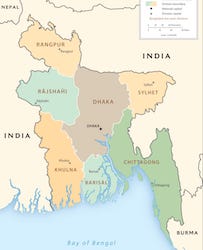
Chittagong. (Bengali: চট্টগ্রাম). The second-largest city in Bangladesh. Home to the Port of Chittagong, it is the busiest port in Bangladesh and the Bay of Bengal. The city is located on the banks of the Karnaphuli River between the Chittagong Hill Tracts and the Bay of Bengal. The Greater Chittagong Area had a population of more than 5.2 2022.
One of the world’s oldest ports with a functional natural harbor for centuries, Chittagong appeared on ancient Greek and Roman maps, including on Ptolemy’s world map. It was located on the southern branch of the Silk Road. In the 9th century, merchants from the Abbasid Caliphate established a trading post in Chittagong.
The port fell to the Muslim conquest of Bengal during the 14th century. It was the site of a royal mint under the Delhi Sultanate, Bengal Sultanate, and Mughal Empire. Between the 15th and 17th centuries, Chittagong was also a center of administrative, literary, commercial, and maritime activities in Arakan, a narrow strip of land along the eastern coast of the Bay of Bengal which was under strong Bengali influence for 350 years.
During the 16th century, the port became a Portuguese trading post, however the Mughal Empire expelled the Portuguese in 1666.

The Nawab of Bengal ceded the port to the British East India Company in 1793. The Port of Chittagong was re-organized in 1887 and its busiest shipping links were with British Burma. In 1928, Chittagong was declared a “Major Port” of British India.
During World War II, Chittagong was a base for Allied Forces engaged in the Burma Campaign. The port city began to expand and industrialize during the 1940s, particularly after the Partition of British India. The city was the historic terminus of the Assam Bengal Railway and Pakistan Eastern Railway.
During the Bangladesh Liberation War in 1971, Chittagong was the site of the Bangladeshi declaration of independence. The port city has benefited from the growth of heavy industry, logistics, and manufacturing in Bangladesh.
The city is served by Shah Amanat International Airport for domestic and external flights. Bangabandhu Sheikh Mujibur Rahman Tunnel, the first and only underwater road tunnel of South Asia, is in Chittagong. The city is the hometown of prominent economists, a Nobel laureate, scientists, freedom fighters, and entrepreneurs.
Chittagong has a high degree of religious and ethnic diversity among Bangladeshi cities, despite having a great Muslim majority. Minorities include Hindus, Christians, Buddhists, and others. The people of Chittagong are generally considered a different ethnic group in contrast to Bengalis.